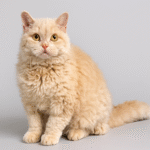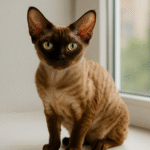If you’ve ever dreamed of a cat that looks angelic but also wants to be your constant, gentle companion, the Birman cat may be just what you’re looking for. With their sapphire-blue eyes, silky cream coats, and adorable white mittens, these cats are not only beautiful but also affectionate without being clingy.
Birmans are wonderfully adaptable. They thrive in quiet apartments just as much as they do in bustling family homes. These sweet-natured cats tend to greet visitors politely and often follow their favorite humans from room to room. If you want a calm cat that still enjoys playtime, the Birman is an excellent match.
Quick Breed Facts
- Origin: Burma (Myanmar) legend; developed in France
- Breed registries: CFA, TICA, FIFe, GCCF
- Weight range: 7–12 lb (males typically larger)
- Lifespan: 12–16 years
- Coat: Medium-length, silky, minimal undercoat
- Colors and patterns: Colorpoint with white “gloves” (mitted); seal, blue, chocolate, lilac, red, cream, and tortie points
- Eye color: Deep blue
- Grooming: Light to moderate (weekly brushing; more during seasonal sheds)
- Activity level: Moderate; playful but not hyper
- Affection level: Very high; people-oriented
- Vocality: Quiet to moderate
- Good with children: Yes, with gentle handling
- Good with other pets: Usually, including cat-friendly dogs
History & Origin
The Birman’s story is full of charm and mystery. Legend says these cats lived alongside temple priests in Burma (now Myanmar), where their gentle nature was revered. Whether or not the legend is fact, it adds to their mystical reputation as the “Sacred Cat of Burma.”
The Birman as we know it today was refined in early 20th-century France. Breeders worked carefully to preserve the signature colorpoint coat with white-gloved paws and their affectionate personality. Though their numbers dwindled during World War II, devoted breeders rebuilt the population, and today the Birman is recognized and loved worldwide.
Personality & Temperament
If you want a cat that loves being near you but doesn’t demand constant attention, the Birman is a great fit. These cats are gentle, social, and steady, making them easy to live with and easy to love. They often follow their people from room to room, happy just to be in your company.
They’re also excellent companions for kids and visitors. Unlike some high-energy breeds, Birmans tend to be polite greeters who enjoy a little attention and then settle quietly nearby. They’re not overly vocal, but they may chirp softly to let you know they’re around.
Activity & Play
Birmans strike a nice balance between playful and calm. They enjoy wave toys, puzzle feeders, and short fetch games, but they’re just as content curling up on a sunny windowsill. Their playful streak shows in bursts, especially as kittens, but they mature into cats who enjoy gentle, daily playtime.

Providing climbing spots like cat trees or shelves will keep them happy, especially if they have a perch by a window to watch the world go by. Once their energy is spent, they’ll often curl up beside you for a nap.
Grooming & Care
One of the nicest surprises about the Birman is how easy their coat is to maintain. Although their fur looks long and fluffy, it has very little undercoat, which means it’s less prone to matting. A weekly brushing session is usually enough to keep them looking silky and tangle-free.
They’ll also need the basics: regular nail trims, occasional eye wiping if tear staining appears, and dental care to keep their mouth healthy. Adding grooming into your weekly routine not only keeps them looking their best but also strengthens your bond.
Health & Lifespan
Birmans are generally known as a healthy, sturdy breed. Many live well into their mid-teens with good care, often reaching 12–16 years. Routine veterinary visits, a balanced diet, and plenty of enrichment go a long way toward keeping them happy and healthy.
The most significant inherited issue documented in Birmans is a rare congenital condition involving sparse coat (hypotrichosis) combined with immune deficiency. Fortunately, this is extremely uncommon today thanks to responsible breeding. In general, most Birman cats enjoy strong health and steady temperaments.
To give your Birman the best chance at a long life, focus on these basics:
- Weight & body condition: Keep them lean—you should feel ribs easily and see a natural waist.
- Dental care: Introduce brushing or enzymatic gel early; schedule professional cleanings when needed.
- Hydration: Many cats drink more with a fountain; fresh water should always be available.
- Senior checkups: From around age 7, biannual vet visits with baseline bloodwork help catch issues early.
Family Compatibility
With their affectionate and easygoing nature, Birmans make wonderful family companions. They usually get along well with children who are gentle and respectful, and they tend to accept other pets—cats or cat-friendly dogs—without much fuss.
Because they love being near their people, Birmans don’t enjoy being left alone for long stretches of time. If your schedule keeps you out of the house often, a second pet (or plenty of engaging toys) can help keep them company.
Diet & Nutrition
Feeding your Birman isn’t complicated, but it’s important to stick with a complete, AAFCO-approved diet. Many owners prefer mostly wet food for hydration, balanced with a measured portion of dry food for nibbling. Introduce any diet changes gradually over a week to avoid upset stomachs.
Because Birmans can gain weight if overfed, portion control is key. Keep an eye on their waistline and energy level, and always offer clean, fresh water. A fountain can make drinking more fun and appealing for them.
Recommended Supplies
Birmans aren’t high-maintenance, but a few thoughtful supplies will make their lives (and yours) even better. A mid-height cat tree gives them a place to climb without overwhelming your living room, and cozy beds or hammocks let them lounge in style.
Interactive toys, puzzle feeders, and a scratching post or two will keep them busy between cuddle sessions. They’ll also appreciate a perch by the window for some bird-watching entertainment.
- Mid-height cat tree or climbing shelves
- Soft beds and window perches
- Interactive toys and puzzle feeders
- Gentle slicker brush + wide-tooth comb
- Litter box 1.5× body length with low-dust, clumping litter
Birman Cat FAQs
Here are some of the most common questions about Birman cats, answered simply and directly. If you’re considering adding one to your family, these quick facts should help you decide if they’re the right fit.
Are Birman cats hypoallergenic?
No cat is truly hypoallergenic. While Birmans may shed less than heavy-coated breeds, people with allergies can still react to their dander and saliva.
How much do Birman cats cost?
The price of a Birman kitten can range anywhere from $700 to $2,000, depending on the breeder, pedigree, and region. Show-quality kittens from champion lines may cost even more. If you’re open to adoption, rescue Birmans or Birman mixes are often available for a much lower fee, usually between $100 and $400.
Do Birmans get along with dogs?
Yes, especially with calm, cat-friendly dogs. Proper introductions and a little patience usually lead to peaceful coexistence.
Do Birmans shed a lot?
Not excessively. Their silky coat with little undercoat sheds less than long-haired breeds like Persians, and weekly brushing helps keep shedding under control.
Are Birmans good apartment cats?
Yes! Their calm but playful nature makes them well-suited for apartment living. Just provide a perch, toys, and daily interaction.
How long do Birmans live?
With good care, many Birmans live 12–16 years or longer. Their combination of robust health and easygoing temperament makes them a joy for many years.








